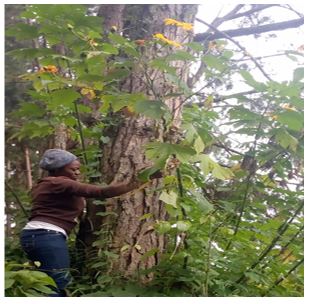2024
She is a junior volunteer researcher with the association African Nature Conservation. Since completing her Master’s thesis on biodiversity in Bamendou in 2020, her interest in forestry research has continued to grow, particularly in the highly degraded areas of western Cameroon. She is committed to contributing to the preservation of ecosystems in these regions while strengthening her expertise in the field to develop and implement ambitious, large-scale ecological solutions.
In the agro-ecological zone of the Western Highlands of Cameroon, natural landscapes have almost entirely disappeared, replaced by other Land Use Types (LUTs), leading to the degradation of their ecological and socio-economic functions in the context of global change. Live hedges (LH), which are ancestral practices, are among the few remaining elements that have managed to preserve significant indigenous floristic diversity while providing goods and services to local populations—hence their resilience to global changes.
Given the ancestral nature of live hedge practices and the limited number of studies conducted on them in the Western Highlands agro-ecological zone, the research aims to:
- Identify the ecosystem goods and services they provide to nearby communities;
- Assess their floristic richness based on inventory data, according to their typology;
- Evaluate their contribution to climate change mitigation through their carbon storage potential.
Beyond the ecosystem goods and services and typology of live hedges, their ecological functions (such as air and soil regulation, biodiversity preservation, etc.) will help determine their resilience in the face of global changes.
